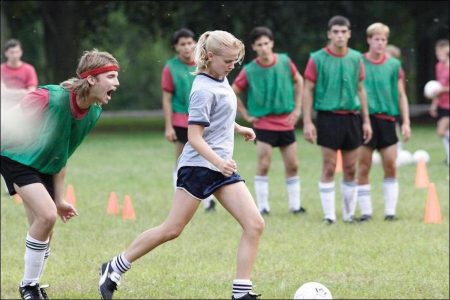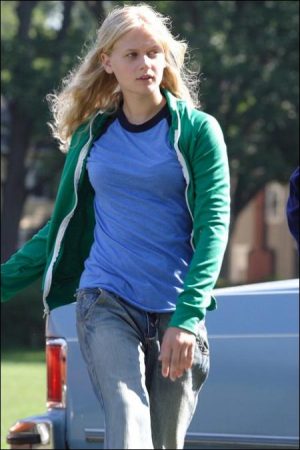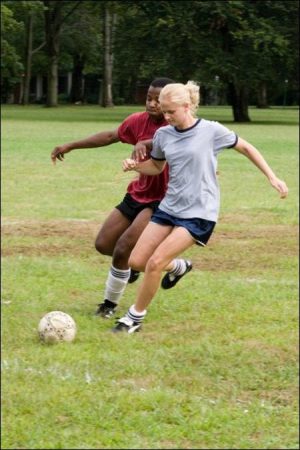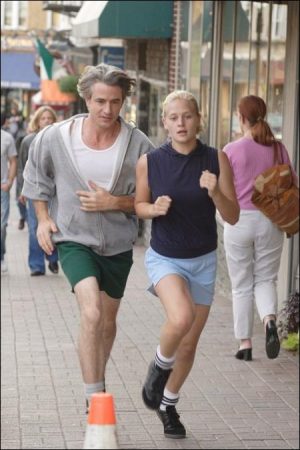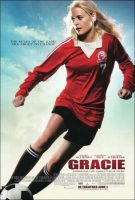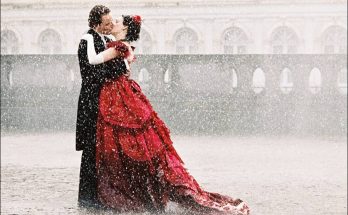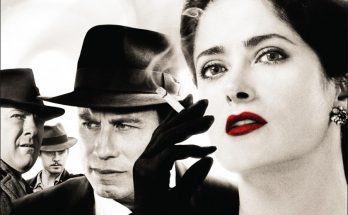Tagline: The rules of the game are about to change.
A teenager faces an uphill battle when she fights to give women the opportunity to play competitive soccer. Based on the real-life story of Elisabeth Shue when she was a girl.
Set in 1978, Gracie is an inspirational film about a teenage girl who overcomes the loss of her brother and fights the odds to achieve her dream of playing competitive soccer at a time when girls’ soccer did not exist. Based on true events from the lives of the Shue family (producer and co-star Andrew Shue, Academy Award-nominated actress Elisabeth Shue), the film is directed by Academy Award-winning director Davis Guggenheim (An Inconvenient Truth), who happens to be part of the family as well, being married to Elisabeth Shue. The film also features a terrific 1970’s soundtrack including classic songs from Boston, Blondie, Aretha Franklin, and the Boss, Bruce Springsteen.
Set in 1978, a teenage girl overcomes the loss of her brother and fights the odds to achieve her dream of playing competitive soccer at a time when girls’ soccer did not exist. Living in South Orange New Jersey, 15 year old Gracie Bowen is the only girl in a family of three brothers. Their family life revolves almost entirely around soccer: her father and brothers are obsessed with the sport, practicing in the backyard’s makeshift field every day from morning ’til night.
Tragedy unexpectedly strikes when Gracie’s older brother Johnny, star of the high school varsity soccer team and Gracie’s only protector, is killed in a car accident. Struggling with grief over her family’s loss, Gracie decides to fill the void left on her brother’s team by petitioning the school board to allow her to play on the boy’s high school varsity soccer team in his place. Her father, a former soccer star himself, tries to prove to Gracie that she is not tough enough or talented enough to play with boys. Her mother, Lindsey Bowen, already an outsider in the sports-obsessed family, is no help either.
Undeterred, Gracie finds reserves of strength she never knew existed, and persists in changing everyone’s beliefs in what she is capable of, including her own. Gracie not only forces her father to wake up from his grief and see her as the beautiful and strong person that she has always been but she also brings her family together in the face of their tragedy.
Living in South Orange New Jersey, 15 year old Gracie Bowen (Carly Schroeder) is the only girl in a family of three brothers. Their family life revolves almost entirely around soccer: her father (Dermot Mulroney) and brothers are obsessed with the sport, practicing in the backyard’s makeshift field every day from morning ’til night. Tragedy unexpectedly strikes when Gracie’s older brother Johnny (Jesse Lee Soffer), star of the high school varsity soccer team and Gracie’s only protector, is killed in a car accident.
Struggling with grief over her family’s loss, Gracie decides to fill the void left on her brother’s team by petitioning the school board to allow her to play on the boy’s high school varsity soccer team in his place. Her father, a former soccer star himself, tries to prove to Gracie that she is not tough enough or talented enough to play with boys.
Her mother, Lindsey Bowen (Elisabeth Shue) already an outsider in the sports-obsessed family, is no help either. Undeterred, Gracie finds reserves of strength she never knew existed, and persists in changing everyone’s beliefs in what she is capable of, including her own. Gracie not only forces her father to wake up from his grief and see her as the beautiful and strong person that she has always been but she also brings her family together in the face of their tragedy.
A Family Project
“The heart of the story was one I’ve wanted to tell for about ten years,” says GRACIE producer and co-star Andrew Shue in discussing the genesis of the film. “In the beginning I wanted to tell a story that paid tribute to our older brother Will, honored our cherished childhood together and used our family sport (soccer) as a backdrop. The story came into focus, however, when I enlisted Davis and my sister Elisabeth to help. Davis saw that it could also be a way to celebrate my sister – and the experience she had playing soccer with boys and growing up in our male-dominated family.”
“The great thing about this project is that our whole family’s involved,” says Andrew. “It really is a dream to get to be able to work with my sister and work with Davis and work with my brother, John who graduated from Harvard Business School and was instrumental in helping us solve all the financial issues we faced. We didn’t set out for it to be a family movie, but then as it started to happen, it was clear that we all needed to be involved.”
With the Shue’s extended family working together, the shooting of GRACIE did not come without its own challenges. “The most difficult thing is the feeling that there’s this real family whose story you’re telling. You want to feel like you’re not cheapening their lives and make sure that you’re telling that story in a fair and truthful way,” says Guggenheim. “We had long talks about that issue, Elisabeth and I would discuss how we could use the family history as a starting point, but ultimately the actors had to find their own characters.”
The Shues Get Their Kicks
In the backyard of their New Jersey home, in the mid-seventies, the Shues measured themselves by how they played soccer. They all wore the same number seven that their father wore when he captained the Harvard College team in 1958. Elisabeth was the only girl playing in South Orange and Maplewood, from ages nine to thirteen in the year-round town soccer leagues.
Will the oldest, captained the Columbia High School team and scored the winning goal in the 1978 State Championship. Younger brother John went on to become a Regional All-American while at Harvard College. Andrew played at Dartmouth, professionally in Africa and later in the U.S. with the Los Angeles Galaxy.
An article in the family’s local paper once touted, “The Shues Get Their Kicks,” explaining how there was a Shue in every single division of their soccer league, from Andrew and Elisabeth’s father down to their younger brother John. “In our family, like in Gracie’s, the way you got attention was to score goals and to stand out as an athlete. I loved the game of soccer and although there were times when being the only girl on boys’ teams was extremely lonely I also loved the competition and challenge of always having to fight to be seen as an equal,” says Elisabeth Shue.
In discussing the sport’s impact on his family, Andrew says, “Soccer really was our lifeblood. It was the thing that defined us. It was the thing that helped give each of us our confidence. It also gave us a connection to our father who had played and gave us that real sense of a shared history and that connection between the generations. I think soccer is the sport most like life. It is free flowing. You have to work and work and work and if you are lucky you put the ball in the goal once. Sometimes that is enough to win.”
The Inspiration
While the Shue family’s love of soccer provided structure for the film, the inspiration arrived in a more tragic form: Elisabeth, Andrew and John suffered a loss similar to the one the Bowens experienced – the loss of their brother Will in an accident in 1988.
“It’s been nearly 20 years since he died, so it’s almost just enough time where you can actually start to talk about it without getting overwhelmed,” says Andrew. “He was just this incredible person who taught all of us about what’s most important in life; your relationships, how you treat each other and how you never give up no matter what the odds are.
Says Elisabeth: “Will was the one who was always most proud of us when we accomplished anything. He was such a kind spirit. The bird in the film was based on a baby hawk named Amber that he found in Maine and kept in his room, even sleeping with it at night to nurse it back to life.” Adds John Shue: “In a conversation with our father a year before he died, Will said – ‘You feel as if everyone should write a book before they die, but their book is already written… the pages live within those they’ve touched’.”
Casting
One of the primary challenges facing the filmmakers was the casting of the title role, after an exhaustive search, the role was given to Carly Schroeder, best know to audiences for her performances in such films as Mean Creek, and Fire Wall, as well as television’s ‘Lizzie Maguire’
“Carly’s amazing. We looked at so many people for this part and she was really the only person out of everybody who could have played the part,” says Elisabeth. “We did see some amazing actresses, but there was something about Carly that was so unique. She has such a strong, willful spirit and her fierceness is so visceral and raw with a real need to prove herself, which I think is so much Gracie. But it was her ability to expose the pain that Gracie faces when she loses her brother which was most extraordinary.” Durmot Mulroney, who plays Gracie’s father: “She (Carly) wound up being quite the little spitfire. What is most impressive is what she’s done physically -learning the sport from scratch.”
2,000 audition tapes for the title role of Gracie were narrowed down to eight candidates: two soccer players with moderate acting experience and half a dozen young actresses who were well-versed performers but had limited exposure to the sport. Though she had played some soccer as a young girl, Schroeder’s commitment to the physical training required for the role proved absolute. (Indeed, the young actress seemed to grow in physical confidence and stature as the film progresses). To help Schroeder with her training, the Shues enlisted the help of Dan Calichman, former player and captain of the Los Angeles’ Galaxy, Calichman spent 12 weeks working with Schroeder on her fitness, strength and soccer skills prior to shooting.
“Carly is really one of the most gifted, extraordinary actresses I’ve ever worked with,” attests Guggenheim. “I kept needing to remind myself that she’s only 15. She’s got the experience and the technique of an actor who’s 20 years older but she’s also got this fierceness that many seasoned actors don’t have. As a director, you dream of having actors as talented and charismatic as her.”
“We still had to find the all-important part of the father,” says Guggenheim. “The authenticity of the story was going to rest with this casting choice. We really lucked out when Dermot agreed to take the part. He not only happened to have played soccer in high school but he was an actor that effortlessly embodies authenticity. Dermot understood the broken nature of this man and how he had to so subtly change and begin to heal as he finally is able to see and accept his daughter in his life for the first time.”
Born to Run
One element of the production that was important to the filmmakers was their decision to shoot the film in New Jersey, where the Shue family spent their childhood. “We talked about shooting it in Canada and trying to save money and we just felt it was crucial to film it in New Jersey,” says Andrew. “It’s been great coming home and spending time in the area. We’ve shot a bunch of scenes in South Orange and Maplewood and the State of New Jersey has played a huge role in the funding of the film, so it’s really been a home-grown project and it’s nice to have that kind of support.”
Not only did the film shoot in the Shue’s home state, but Andrew and Elisabeth’s high school, local pizzerias, and teenage hangouts all make appearances. Says Andrew: “It was really special to be in our high school, it just means a lot to walk in there and know that you’re coming back, to walk down the same path that you traveled before and to actually have your movie set be the place that you grew up-it’s pretty magical. The scenes come alive because it’s real.”
The magic only continued for the Shues when they were able to get the Boss involved. Bruce Springsteen, the Garden State’s master poet, made a rare exception and provided his song “Growin Up” for the film’s pivotal montage.
“I hope that everybody who sees this film laughs at least once, cries at least once, and cheers at least once. If we’ve done that, we will have succeeded,” says Elisabeth. “Most importantly, I hope that people who see the film realize that no matter how tough life gets, if you stick together with the people you care about, you can get through anything. Like Johnny says to Gracie in the beginning of the movie – ‘You can do anything’ – my brother Will taught us that with his love we could… the journey of making this film is proof of that.”
Gracie (2007)
Directed by: Bob Shaye
Starring: Elisabeth Shue, Dermot Mulroney, Carly Schroeder, Andrew Shue, Emma Bell, Vasilios Mantagas, Trevor Heins, Josh Caras, Madison Arnold, Karl Girolamo
Screenplay by: Karen Janszen, Lisa Marie Peterson
Production Design by: Dina Goldman
Cinematography by: Chris Manley
Film Editing by: Elizabeth Kling
Costume Design by: Elizabeth Caitlin Ward
Set Decoration by: Melanie J. Baker
Art Direction by: Jennifer Dehghan
Music by: Mark Isham
MPAA Rating: PG-13 for brief sexual content.
Distributed by: Picturehouse
Release Date: June 1, 2007
Visits: 97
